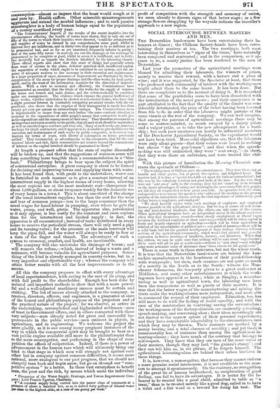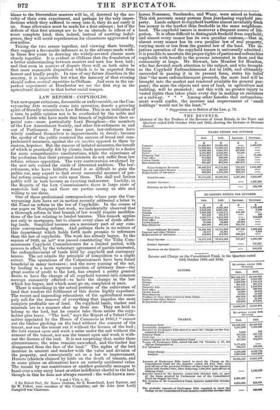SOCIAL INTERCOURSE BETWEEN MASTERS AND MEN.
THE Dorsetshire landowners have been entertaining their la- bowers at dinner ; the Oldham factory-hands have been enter- taming. their masters at tea. The two meetinbss, both most interesting in themselves as " signs of the times," have naturally been compared and contrasted ; and in the comparison, as it ap- pears to us, a scanty justice has been rendered to the men of
Dorsetshire.
Last year the promoters of the agricultural meetings were
blamed for admitting their labourers, the winners of prizes, merely to receive their reward, with a lecture and a glass of wine ; and it was suggested, by the Spectator at least, that those who professed such community of interest with the working-men might admit them to the same board. It has been done. But there are complaints as to the manner of doing it. It is remarked that some of the gentlefolks seem to have been dissatisfied with the introduction of the novel guests ; and their annoyance is in
part attributed to the fact that the quality of the dinner was con- siderably deteriorated, the price of the ticket having been lowered from 10s. to 3s. in order that the labourers might partake of the same viands as the rest of the company. We can well imagine, that among the patrons of agricultural meetings there may be some so narrow-minded, so much swayed by a dainty palate and a vulgar pride, as to take the new arrangement for a hard- ship ; but such poor creatures can hardly be influential members of the Dorchester Agricultural Society, or the experiment would not have been tried. More solid objections are, that the labourers were only silent guests—that their voices were heard in nothing but cheers " for the gentlemen"; and that when the speech- making was still unfinished, they were "sent away,"—in short, that they were there on sufferance, and were treated like chil- dren.
With this picture of humiliation the Morning Chronicle. con- trasts the spectacle at Oldham— "Time working-men of Oldham gave the entertainment. They were there, not as humble amid silent guests, but as proud, free-spoken, and delighted hosts. The masters had, it is true, a special tea-table set apart for their accommodation'; but this was by the voluntary courtesy and good taste of the men. For the rest, they were not sent away' early in the evening; they did not stand up' to be lectured on the moral advantages of eating and drinking in the same morn with rich people; not did they sit tongue-tied to hear great men talk. An operative took the chair, and operatives were among the speakers who' addressed the meeting on the present position of the industrious classes, and on the vital importance of maintaining good feeling between employers and employed.'
"We shall heartily rejoice when such meetings of employers and employed
become possible in the agricultural districts. But we beg to assure all well-mean- Mg, and kind-hearted landlords, that like effects can only come of like causes. When agricultural labourers have an independent status in the labour-market- when they find themselves wanted—when steady employment at liberal wages becomes the habitual condition of their existence,—which will be when capital is freely and largely expended on agriculture—which will be when agriculture is relieved of the uncertainties of political prices and political tenures,—there will be a solid basis laid for the gradual development of those feelings between different sections of the agricultural community, which would find natural and graceful expression in festive meetings of landlords, farmers, and labourers. When that day arrives, we may be quite sure that nothing will be said about'experiments'; theta, ourer will not be put at a side-table—will not be sent away'--aud will find some more articulate mode of utterance than three cheers for the gentlemen.'"
There is some truth in these strictures, but not the whole truth.
It is true that the Dorsetshire landowners axe behind the Lan- cashire manufacturers in the heartiness of their good-fellowship with workpeople ; but then, such reunions are not quite so much of a novelty in the North as in the South : witness the Man- chester Athemeum, the tea-party given to a great coalowner at Middleton, and many other entertainments at which the work- ing-men have appeared as hosts ; while at Bingley, a manufac- turing as well as agricultural town, the labouring men have been the companions as well as guests of their masters. It is true that the better wages of the manufacturing and mining dis- tricts make the working-classes more independent, and more able to command the respect of their employers. Education, too, has still more to do with the feeling of social equality, and with the ease of the master-class in venturing among the servant-class : the working-men of the factory-districts are eminently a reading, speech-making, and conversing class ; their ideas accordingly are not limited to the narrow sphere of their personal experiences; and they have considerable adaptability to the circumstances into which they may be thrown. Their manners are marked by a manly bearing and a total absence of servility ; and yet there is immeasurably less of rudeness than among the agricultural la- bouring-classes : they have much of the courtesy that belongs to self-respect. They know that they are men of the same metal as their masters, though they may lack "the guinea's stamp" ; and they can tell him so, in set phrase, if he forgets himself: The agricultural labouring-class are behind their urban brethren in these things.
It is, however, a non-sequitur, that because they cannot enforce blame to the Dorsetshire masters will be, if, deterred by the no- velty of their own experiment, and perhaps by the very imper- fections which they suffered to creep into it, they do not carry it on. Some allowance must be made for a first attempt ; but if the defects of that first attempt are to be an obstacle to others of a more complete kind, then indeed, instead of meriting indul- gence, they will merit reprehension for clumsiness aggravated by cowardice.
Taking the two scenes to,,o.ether, and viewing them broadly, they suggest a favourable inference as to the advance made with- in these few years in drawing the widely-severed classes more closely together. It is evident at Oldham that the foundation of a better understanding between masters and men has been laid ; and that even in matters of dispute there will on both sides be that more reasonable disposition which is to be expected from honest and kindly people. In case of any future disorders in the country, it is impossible but what the memory of that evening should soften mutual asperities in Oldham. And even in the im- perfect experiment at Dorchester we see the first step in the agricultural districts to that better social temper.



























 Previous page
Previous page